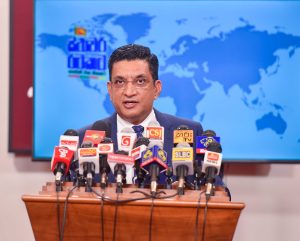Sri Lanka Navigates the Seas of Geopolitics
Posted on January 8th, 2024
By Rathindra Kuruwita Courtesy The Diplomat
Pressure from India and the U.S. on the docking of Chinese research vessels at its ports appears to have prompted Sri Lanka to impose a one-year moratorium on visits by foreign research vessels.
January 08, 2024

In recent months, Sri Lanka has found itself at the center of an escalating geopolitical storm, which seems to have prompted it to impose a one-year moratorium on foreign research vessels. Behind this seemingly local decision looms the intensifying tensions between China and the Quad, an alliance comprising the United States, India, Japan, and Australia.
The decision is expected to affect Chinese ships the most.
The Indian Ocean has been an arena of great power competition and conflict for centuries. In recent years, it has become a theater for strategic maneuvering, where China’s expanding influence is being countered by the Quad.
A coalition formed in response to China’s growing regional and global reach, the Quad seeks to curb Chinese initiatives, notably the Belt and Road Initiative (BRI), and assert its dominance in the Indo-Pacific region. This power struggle manifests in various forms, including increased scrutiny of Chinese activities in vital maritime routes.
For Sri Lanka, a nation that is strategically positioned in the heart of the Indian Ocean, this geopolitical tug-of-war poses significant challenges. The island nation has historically enjoyed relationships with multiple global powers, leveraging these ties for economic development and infrastructure projects. However, the recent decision to impose restrictions on foreign research vessels, largely impacting Chinese ships, underscores the complexities of maintaining this delicate balance amid mounting pressures.
It is evident that Sri Lanka’s decision to impose a one-year moratorium on foreign research vessels has come in response to relentless pressure from India and the United States to halt the growing frequency of Chinese research vessels docking at Sri Lankan ports.
Announcing the moratorium, Foreign Minister Ali Sabry claimed that Sri Lanka will spend the next year preparing guidelines on procedures to follow when a foreign research vessel arrives in the country. Sri Lanka currently lacks a comprehensive policy concerning these vessels, leading to a situation where various government institutions issue conflicting statements regarding the intentions and parameters of recent Chinese research vessels’ arrivals. This lack of coherence has significantly contributed to the confusion among all involved parties.
Uditha Devapriya, lead researcher for the Colombo-based international relations think tank, Factum, said two Chinese research vessels docked in Sri Lanka in 2022 and 2023, and this caused a lot of diplomatic tension for Sri Lanka. The Chinese have also asked permission for the research vessel Xiang Yang Hong 3 to dock in Sri Lanka in January 2024.
The proposed arrival could have sparked another significant diplomatic dispute for Sri Lanka,” Devapriya explained, pointing to likely objections from India and the U.S. With parliamentary and presidential elections scheduled for 2024, the influence of China, India, and the U.S. could impact the election’s outcome. Clearly, President Ranil Wickremesinghe aims to steer clear of controversies in this crucial electoral year.”
Research vessels have been arriving in Sri Lanka for decades. The recent hyperbolic scrutiny of these ships by a section of the media, however, is new. The scrutiny for the most part comes from the Indian media. India is a close ally of the United States in its containment efforts of China.
China has developed rapidly in the last five decades and is on the verge of becoming a regional hegemon. International relations scholars of the realist school have insisted that this is not a development the United States, the only current regional hegemon, would readily accept. Once China becomes the undisputed power in Asia, it can intervene in other theaters, a privilege only the U.S. currently enjoys.
Sri Lankan attorney-at-law and expert in international security Indika Perera said that announcing a moratorium provides Sri Lanka temporary relief from Indian and American pressure.
Perera said that Sri Lanka has not clearly communicated the fact that it has banned research vessels from all countries. The prevailing impression in China is that Sri Lanka has prohibited only Chinese research vessels, while keeping its ports open for research vessels from other nations, Perera, who was in China recently, said.
My impression was that the Chinese media too had picked up on Indian reporting. A lot of people asked me why Sri Lanka has targeted Chinese vessels alone. They had not seen the official statement by our foreign minister,” Perera said. This is a major problem Sri Lanka is facing. It does not communicate its policies and its thoughts. If we clearly articulated our positions through the media and conveyed our stance through diplomatic channels, we could avoid a lot of confusion.”
Perera said that across Asia, the Quad has been trying to counter BRI initiatives and there is intense pressure on the smaller nations to pick a side. With the absence of a movement similar to the Non-Aligned Movement, which once allowed smaller nations to navigate international power politics without firmly aligning with one camp or the other, smaller Asian countries will be compelled to choose between China and the Quad.
Sri Lanka faces the daunting task of safeguarding its sovereignty and interests, while balancing relationships with major global players. It finds itself walking a tightrope, striving to avoid becoming collateral damage in the escalating Cold War tensions.
The scrutiny faced by Chinese research vessels in Sri Lanka serves as a poignant reminder of the intricate dance smaller nations must perform in a world dominated by geopolitical rivalries. As the storm clouds of this Cold War continue to gather, Sri Lanka stands as a testament to the complex realities faced by nations seeking to carve their path in a world overshadowed by power struggles.